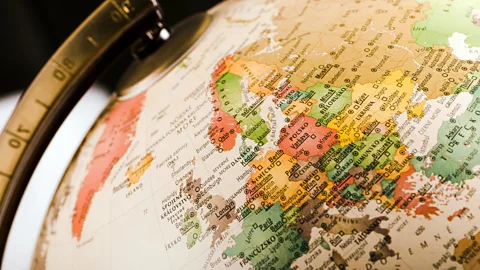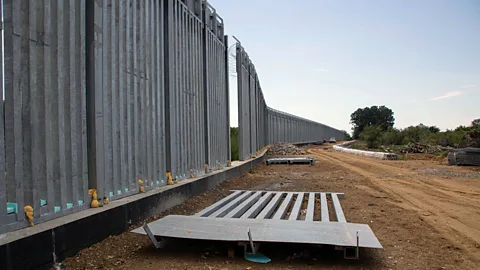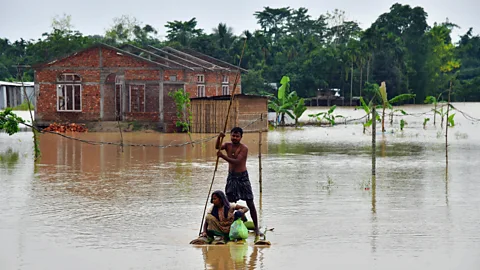Is the world ready for mass migration due to climate change?
 Alamy
AlamyWith up to three billion people expected to be displaced by the effects of global warming by the end of the century, should it lead to a shift in the way we think about national borders, asks Gaia Vince?
I've had an obsession with maps ever since I first sought my bearings in Winnie the Pooh's "Hundred Aker Wood", trying to discover where was "nice for piknicks", and the locations of the characters' houses. My childhood was spent studying and drawing treasure maps, charting imaginary lands and plotting routes to faraway places I longed to visit.
Today, my home is plastered with the maps I've collected or been given – reminders of places that are special to me. By my desk, I have a large world map, the continents distinguished from the oceans by their mosaic of colours. Each coloured patch is a country, separated from its neighbour by a neat line drawn onto this two-dimensional representation of our world.
Comment & analysis
Gaia Vince is the author of Nomad Century: How to Survive the Climate Upheaval (2022, Allen Lane).
The borders are cleanly defined, ink separating nationalities destined for different fates. For me, these lines mark exciting possibilities, with the potential for exploration and adventure, to visit foreign cultures with different foods and languages. For others, they are prison walls that limit all possibilities.
Borders define our fate, our life expectancy, our identity, and so much more. Yet they are an invention just like the maps I used to draw. Our borders don't exist as immutable facets of the landscape, they are not natural parts of our planet, and were invented relatively recently.
It can be argued, however, that most of these imaginary lines are not fit for the world of the 21st Century with its soaring population, dramatic climate change and resource scarcity. Indeed, the idea of keeping foreign people out using borders is relatively recent. States used to be far more concerned about stopping people from leaving than preventing their arrival. They needed their labour and taxes, and emigration still poses a headache for many states.
There are, however, true human borders set not by politics or hereditary sovereigns, but by the physical properties of our planet. These planetary borders for our mammal species are defined by geography and climate. Humans cannot live in large numbers in Antarctica or in the Sahara Desert, for instance. As global temperatures increase, causing climate change, sea level rise and extreme weather over the coming decades, large parts of the world that are home to some of the biggest populations will become increasingly hard to live in. Coastlines, island states and major cities in the tropics will be among the hardest hit, according to predictions by climate scientists.
Unable to adapt to increasingly extreme conditions, millions – or even billions – of people will need to move.
 Nicolas Economou/Getty Images
Nicolas Economou/Getty ImagesThe most densely populated areas of the planet are clustered around the 25-26th north parallels which has traditionally been the latitude of most comfortable climate and fertile land. An estimated 279 million people are packed into this thin band of land, which cuts through countries including India, Pakistan, Bangladesh, China, the United States and Mexico.
But the conditions here are changing. On average, climate niches – the range of conditions at which species can normally exist – around the world are moving polewards at a pace of 1.15m (3.8ft) per day, although it's far faster in some places. Adapting to the changing climate will mean chasing our own shifting niche – which for much of human history has been within the temperature range -11C to 15C (12F to 59F) – as it migrates north from the equator. True livability limits are the borders we must worry about as the world warms over this century, bringing unbearable heat, drought, floods, fires, storms, and coastal erosion that make agriculture impossible and displace people.
Already record numbers of people are being forced to flee their homes with each passing year. In 2021, there were 89.3 million people, double the number forcibly displayed a decade ago, and in 2022 that number reached 100 million, with climate disasters displacing many more people than conflicts. Floods displaced 33 million people in Pakistan this year, while millions more in Africa have been affected by drought and the threat of famine, from the Horn of Africa to the continent's west coast.
UN High Commissioner for Refugees Filippo Grandi appealed to global leaders at the COP27 climate change conference to take bold action to tackle the humanitarian consequences of global warming. That change needs to be "transformational" according to the UNHRC. "We cannot leave millions of displaced people and their hosts to face the consequences of a changing climate alone," says Grandi.
Without action, hundreds of millions people will have to leave their homes by 2050, according some estimates. One study from 2020 predicts that by 2070, depending on scenarios of population growth and warming, "one to three billion people are projected to be left outside the climate conditions that have served humanity well over the past 6,000 years".
With so many people on the move, will this mean that invented political borders, ostensibly imposed for national security, become increasingly meaningless? The threat posed by climate change and its social repercussions dwarf those surrounding national security. Heatwaves already kill more people than those who die as a direct result of violence in wars.
Compounding this, the global population is still growing, particularly in some of the regions worst hit by climate change and poverty. Populations in Africa are set to almost triple by 2100, even as those elsewhere slow in growth. This means there will be a greater number of people in the very areas that are likely to be worst affected by extreme heat, drought and catastrophic storms. A greater number of people will also need food, water, power, housing and resources, just as these become ever harder to supply.
Meanwhile, most countries in the Global North are facing a demographic crisis in which people are not having enough babies to support an ageing population. Managed mass migration could thus help with many of the world's biggest problems, reducing the number of people living in poverty and climate devastation, and helping northern economies build their workforce.
But the main barrier is our system of borders – movement restrictions either imposed by someone's own state or by the states they wish to enter. Today just over 3% of the global population are international migrants. However, migrants contribute around 10% of global GDP or $6.7tn (£5.9tn) – some $3tn (£2.6tn) more than they would have produced in their origin countries. Some economists, such as Michael Clemens at the Center for Global Development in the US, calculate that enabling free movement could double global GDP. In addition, we would see an increase in cultural diversity, which studies show improves innovation. At a time when we have to solve unprecedented environmental and social challenges, it could be just what is needed.
 Haywood Magee/Hulton Archive/Getty Images
Haywood Magee/Hulton Archive/Getty ImagesHow to think about X
This series will change the way you look at the world. Whether it's the concept of "time", "consumerism", or even "creativity", many of us tend to think about – and define – certain ideas in the ways we’ve been taught. But how did our conceptualisation of these big ideas evolve? How to Think About X searches for new ideas about our lives, the concepts that govern them and our future.
Removing borders or making them far more flexible, especially to labour flows, has the potential to improve humanity's resilience to the stresses and shocks of global climate change. Managed well, migration could benefit everyone.
What if we thought of the planet as a global commonwealth of humanity, in which people were free to move wherever they wanted? We'd need a new mechanism to manage global labour mobility far more effectively and efficiently – it is our biggest economic resource, after all. There are already wide-ranging global trade deals for the movement of other resources and products, but few that deal with labour movement.
Some 60% of the world's population is under the age of 40, half of these (and growing) under 20, and they will form most of the world's people for the rest of this century. Many of these young, energetic jobseekers are likely to be among those moving as the climate changes – will they add to economic growth to build sustainable societies, or will their talents be wasted?
The conversation about migration has become stuck on what ought to be allowed, rather than planning for what will occur. I believe nations need to move on from the idea of controlling migration to managing migration. At the very least, we need new mechanisms for lawful economic labour migration and mobility, and far better protection for those fleeing danger. Everyone could be offered an official form of United Nations citizenship in addition to their birth citizenship. For some people, such as those born in refugee camps, lacking papers, or citizens of small island states that will cease to exist later this century, UN citizenship may well be their only access to international recognition and assistance, even though citizenship is a human right. Passports could be issued on the back of this.
The political theorist David Held argued that we have outgrown our national boundaries through increasing globalisation, and now live in "overlapping communities of fate" from where we should form a cosmopolitan democracy at a global level. Today, we are experiencing a planetary crisis and I believe it is time to see ourselves as members of one globally dispersed species that must cooperate to survive. The scale of the climate crisis requires new global cooperation and, I believe, new international citizenship with global bodies for migration and for the biosphere – new authorities that are paid for by our taxes and to which nation states are accountable.
Currently, the United Nations has no executive powers over nation states, but that may well need to change if we are to bring down global temperatures, reduce the concentration of carbon dioxide in the atmosphere and restore the world's biodiversity. Global governance could also be useful in coordinating the vast new mobile workforce, perhaps using an international quota system to help allocate people to positions during the mass climate migrations of this century. But it would also face challenges created by bureaucracy, corruption and lobbying by powerful corporations.
Underpinning global governance, however, there also needs to be strong states. The tension between the desires and needs of the individual and society are very real for us all, and hard enough to reconcile when our society is a small, closely knit group, let alone the population of the whole planet. It's hard to care, for example, about a nameless, faceless stranger in a country you've never visited when making choices about your own life in a city thousands of miles from them. Most people find hard to balance the needs of a stranger one street away. Successful nation states help to manage this with structures and institutions that ensure a useful level of cooperation between strangers that nurtures a strong society in which we all can succeed. We willingly make small, daily sacrifices of time, energy and resources as individuals – paying taxes, for instance – to ensure our societies operate. Most of us do this because it's our society, our social family, our nation state.
The invention of the nation state has been a very powerful tool in enabling us to cooperate so well. As the political theorist David Miller put it: "Nations are communities that do things together."
It would seem unwise, then, to try to completely dismantle or abandon our existing geopolitical system in the brief time we have to prepare for the massive disruption that is expected to occur over the course of this century.
Only strong nation states will be capable of setting up the systems of governance that will help our species survive climate change. Only strong nation states will be able to manage a massive movement of migrants from different geographies and cultures to the native population.
It may instead require a blend between internationalism and nationalism.
In recent decades, the growth of globalisation has led to greater internationalism – a citizen of London may often feel more commonality with a citizen of Amsterdam or Taiwan than with someone from a small country town in Britain. This may not matter for many successful urbanites, but natives of more rural areas can feel left behind by their own country as once dominant industries decline, and social spaces and cultural traditions dwindle away. This creates resentment and fear of the kind that can lead to prejudice against immigrants, as was seen in parts of the UK during the Brexit debate.
 Biju Boro/AFP/Getty Images
Biju Boro/AFP/Getty ImagesOpen borders do not have to mean no borders or the abolition of nation states, though. It may be necessary to explore different types of nation states, with different governance options. Will states that are most affected by climate change buy or rent territory in safer places? Or will we see charter cities that operate under different jurisdictions and rules to the territory surrounding them, or floating states that build new territory on the waves?
It will take work to reinvent the concept of the nation state so it becomes more inclusive so that it strengthens local connections while forging greater and more equitable global networks. There are multiple benefits in encouraging commonality, a kinship with our fellows, based on our shared societal project, language and cultural works. These traits matter to people enough to make patriotism a powerful source of identity.
So why not also engender patriotic feeling about our nations' air, land and water, to encourage people to look after them.? One approach, since we all face environmental threats, might be to enlist military and other security institutions in the struggle against climate change. National service for younger citizens and immigrants to help with disaster relief, nature restoration, agricultural and social efforts could be another solidarity-creating step. And we may need to restore or invent new national traditions that are environmentally or socially beneficial, and for which citizens can feel pride and respect. These could include social groups and clubs that sing, create, play sport or perform together, and to which members can belong for life. These traditions can help maintain dignity in hard times and provide patriotic meaning for immigrants to assimilate to.
The new patriotic narrative could be about civic nationalism, based on the common good, with rights and duties, and a passionate cultural attachment to nature, and to protecting and conserving places of national (or international) importance.
Costa Rica, for instance, embraced the term pura vida, broadly meaning "good life", as a national ethos, mantra and identity. Its use became widespread from the 1970s, when refugees from the violent conflicts in neighbouring Guatemala, Nicaragua and El Salvador relocated to the country in large numbers. Costa Rica, a small Central American country that has no standing army and instead invests heavily in nature protection and restoration alongside social services such as health and education, used this outlook on life to help define its character and integrate new immigrants.
"A person choosing to use this phrase thus is not only alluding to this shared ideology and identity, he/she is at the same time constructing that identity by means of expressing it," says Anna Marie Trester of New York University. "Language is a very important tool of self-construction."
This offers us a new way of looking at national pride. It doesn't have to mean seeing "your people" as better than other nations', nor does it mean a centralisation of meaning and power. Instead, it can involve the devolution of traditions and an appreciation of regionality and of the enormous cultural value of new citizens. The European Union is an example of supranational identity that allows citizens to feel they are European and identify with the values of the EU, but without having to give up their national identity.
A similar idea can apply within nations as well as between them. In the UK, for instance, London's Chinatown is rightly a much-visited tourist destination, as is Little India – they are part of the nation's identity, even though Chinese Brits and British Indians often face prejudice and socioeconomic disadvantage.
To earn national pride rather than suffer divisive tribalism, a nation needs to reduce inequality. The state must invest in the people for the people to feel invested in the state. That means putting social and environmental issues first in ways that are for the benefit of all, rather than a small tribe of global aristocrats. The Green New Deals proposed in the European Union and the US are examples of policies aimed at restoring economies, providing jobs and boosting dignity while helping unite people in a bigger social project of environmental transformation.
Try, if you will, to clear from your mind the idea of people being fixed to a location they were born in, as if it affects your value as a person or your rights as an individual. As if nationality were anything more than an arbitrary line drawn on a map. See instead these lines as fusions of cultural richness, transitions rather than barriers across the possibilities that Earth's lands offer us all.
* Gaia Vince is the author of Nomad Century: How to Survive the Climate Upheaval and a freelance science journalist and broadcaster.
--
